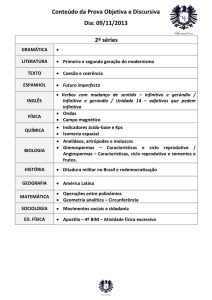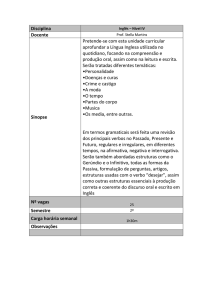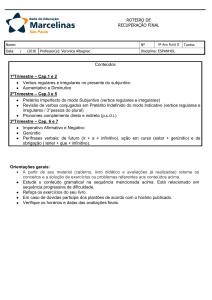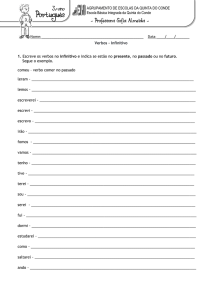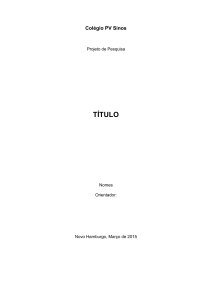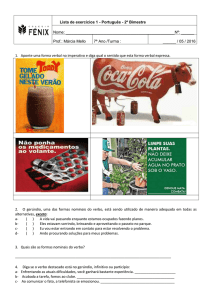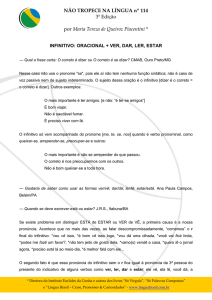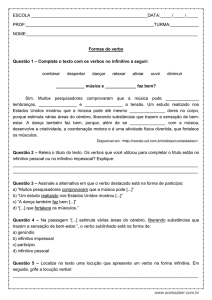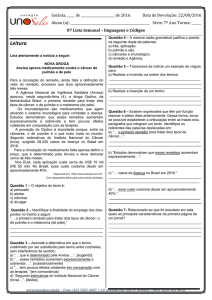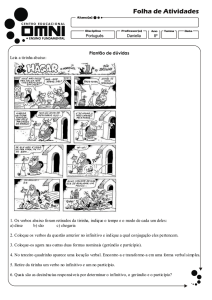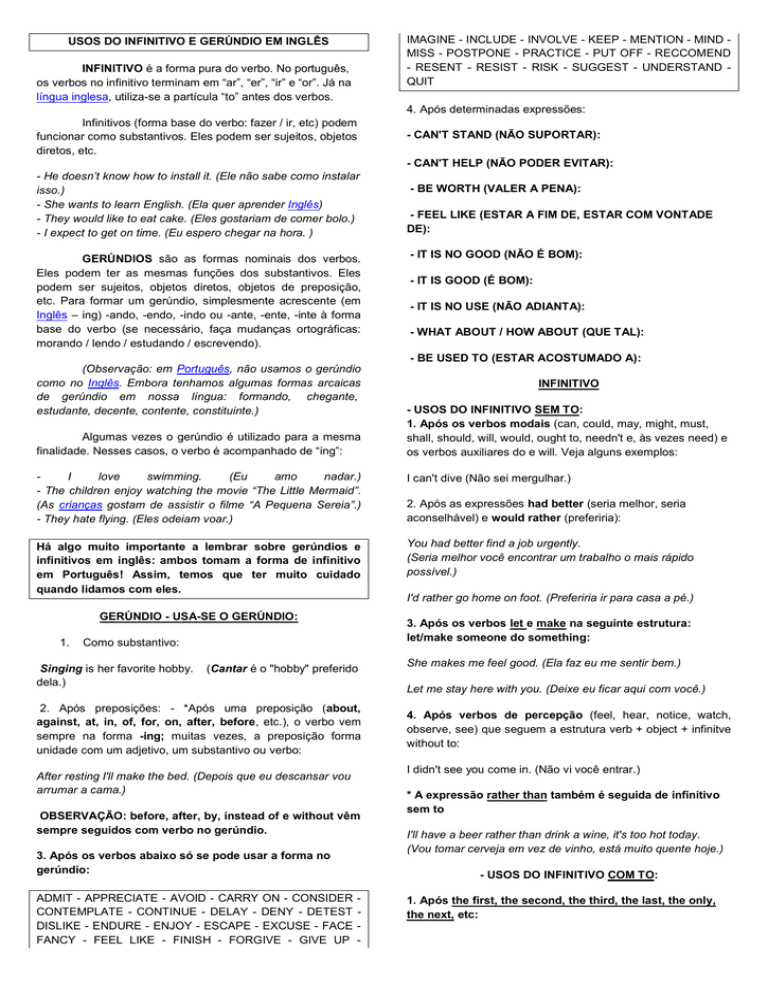
IMAGINE - INCLUDE - INVOLVE - KEEP - MENTION - MIND MISS - POSTPONE - PRACTICE - PUT OFF - RECCOMEND
- RESENT - RESIST - RISK - SUGGEST - UNDERSTAND QUIT
USOS DO INFINITIVO E GERÚNDIO EM INGLÊS
INFINITIVO é a forma pura do verbo. No português,
os verbos no infinitivo terminam em “ar”, “er”, “ir” e “or”. Já na
língua inglesa, utiliza-se a partícula “to” antes dos verbos.
4. Após determinadas expressões:
Infinitivos (forma base do verbo: fazer / ir, etc) podem
funcionar como substantivos. Eles podem ser sujeitos, objetos
diretos, etc.
- CAN'T STAND (NÃO SUPORTAR):
- CAN'T HELP (NÃO PODER EVITAR):
- He doesn’t know how to install it. (Ele não sabe como instalar
isso.)
- She wants to learn English. (Ela quer aprender Inglês)
- They would like to eat cake. (Eles gostariam de comer bolo.)
- I expect to get on time. (Eu espero chegar na hora. )
GERÚNDIOS são as formas nominais dos verbos.
Eles podem ter as mesmas funções dos substantivos. Eles
podem ser sujeitos, objetos diretos, objetos de preposição,
etc. Para formar um gerúndio, simplesmente acrescente (em
Inglês – ing) -ando, -endo, -indo ou -ante, -ente, -inte à forma
base do verbo (se necessário, faça mudanças ortográficas:
morando / lendo / estudando / escrevendo).
- BE WORTH (VALER A PENA):
- FEEL LIKE (ESTAR A FIM DE, ESTAR COM VONTADE
DE):
- IT IS NO GOOD (NÃO É BOM):
- IT IS GOOD (É BOM):
- IT IS NO USE (NÃO ADIANTA):
- WHAT ABOUT / HOW ABOUT (QUE TAL):
- BE USED TO (ESTAR ACOSTUMADO A):
(Observação: em Português, não usamos o gerúndio
como no Inglês. Embora tenhamos algumas formas arcaicas
de gerúndio em nossa língua: formando, chegante,
estudante, decente, contente, constituinte.)
Algumas vezes o gerúndio é utilizado para a mesma
finalidade. Nesses casos, o verbo é acompanhado de “ing”:
INFINITIVO
- USOS DO INFINITIVO SEM TO:
1. Após os verbos modais (can, could, may, might, must,
shall, should, will, would, ought to, needn't e, às vezes need) e
os verbos auxiliares do e will. Veja alguns exemplos:
I
love
swimming.
(Eu
amo
nadar.)
- The children enjoy watching the movie “The Little Mermaid”.
(As crianças gostam de assistir o filme “A Pequena Sereia”.)
- They hate flying. (Eles odeiam voar.)
I can't dive (Não sei mergulhar.)
Há algo muito importante a lembrar sobre gerúndios e
infinitivos em inglês: ambos tomam a forma de infinitivo
em Português! Assim, temos que ter muito cuidado
quando lidamos com eles.
You had better find a job urgently.
(Seria melhor você encontrar um trabalho o mais rápido
possível.)
GERÚNDIO - USA-SE O GERÚNDIO:
1.
(Cantar é o "hobby" preferido
She makes me feel good. (Ela faz eu me sentir bem.)
Let me stay here with you. (Deixe eu ficar aqui com você.)
2. Após preposições: - *Após uma preposição (about,
against, at, in, of, for, on, after, before, etc.), o verbo vem
sempre na forma -ing; muitas vezes, a preposição forma
unidade com um adjetivo, um substantivo ou verbo:
4. Após verbos de percepção (feel, hear, notice, watch,
observe, see) que seguem a estrutura verb + object + infinitve
without to:
I didn't see you come in. (Não vi você entrar.)
After resting I'll make the bed. (Depois que eu descansar vou
arrumar a cama.)
OBSERVAÇÃO: before, after, by, instead of e without vêm
sempre seguidos com verbo no gerúndio.
3. Após os verbos abaixo só se pode usar a forma no
gerúndio:
ADMIT - APPRECIATE - AVOID - CARRY ON - CONSIDER
CONTEMPLATE - CONTINUE - DELAY - DENY - DETEST
DISLIKE - ENDURE - ENJOY - ESCAPE - EXCUSE - FACE
FANCY - FEEL LIKE - FINISH - FORGIVE - GIVE UP
I'd rather go home on foot. (Preferiria ir para casa a pé.)
3. Após os verbos let e make na seguinte estrutura:
let/make someone do something:
Como substantivo:
Singing is her favorite hobby.
dela.)
2. Após as expressões had better (seria melhor, seria
aconselhável) e would rather (preferiria):
* A expressão rather than também é seguida de infinitivo
sem to
I'll have a beer rather than drink a wine, it's too hot today.
(Vou tomar cerveja em vez de vinho, está muito quente hoje.)
- USOS DO INFINITIVO COM TO:
-
1. Após the first, the second, the third, the last, the only,
the next, etc:
I was the first to arrive this morning.
(Fui o primeiro a chegar hoje de manhã.)
- VERBOS SEGUIDOS DE INFINITIVO OU GERÚNDIO SEM
MUDANÇA DE SIGNIFICADO:
2. Após adjetivos, quando não forem seguidos por
preposição e quando um adjetivo ou advérbio estiver
acompanhado de too e enough:
Pode-se usar infinitivo ou gerúndio, sem diferença de
significado, depois dos seguintes verbos: attempt, begin, can't
bear, continue, intend, like, dislike, love, hate, prefer, start, be
(not) acostumed to.
My car is hard to park because it is too big. (Meu carro é difícil
de estacionar porque é muito grande.)
I started playing / to play the violin when I was ten. (Comecei a
tocar violino aos dez anos.)
3. Após alguns verbos. Os mais comuns são:
AFFORD - AGREE - APPEAR - ARRANGE - ASK - ATTEMPT
- (CAN'T BEAR) - BE ABLE - BEG - BEGIN - CARE CHOOSE - CONSENT - CONTINUE - DARE - DECIDE EXPECT - FAIL - FORGET - GO ON - HAPPEN - HATE HAVE - HELP - HESITATE - HOPE - INTEND - INVITE LEARN - LIKE - LOVE - MANAGE - MEAN - NEGLECT OFFER - PLAN - PREFER - PREPARE - PRETEND PROPOSE - PROMISE - REFUSE - REGRET - REMEMBER SEEK - SEEM - START - SWEAR - TROUBLE - TRY - WANT
- WISH
4. Would like (gostaria), would love (adoraria), would prefer
(preferiria) e would hate (detestaria) pedem sempre to +
infinitivo:
- VERBOS SEGUIDOS DE INFINITIVO OU GERÚNDIO COM
MUDANÇA DE SIGNIFICADO
Alguns verbos aceitam as duas estruturas com usos e
sentidos diferentes. Veja alguns exemplos:
remember - forget - go on - mean - try - regret - stop
1. Remember
- Remember + gerúndio se refere a uma ação passada,
significa lembrar-se de ter feito algo:
- Remember + infinitivo refere-se a uma ação futura, significa
lembrar-se de fazer algo:
2. Forget
I would like to ask a question. (Gostaria de fazer uma
pergunta.)
I'd love to marry him. (Adoraria casar com ele.)
5. Após o verbo to be:
The main thing is to relax. (O principal é relaxar.)
6. Após a estrutura verbo + objeto + (not) to + infinitivo.
Dentre esses verbos os mais comuns são:
ADVISE - ALLOW - ASK - (CAN'T) BEAR - BEG - CAUSE COMMAND - COMPEL - ENCOURAGE - EXPECT - FORBID FORCE - GET - HATE - HELP - INSTRUCT - INTEND INVITE - LEAVE - LIKE - LOVE - MEAN - NEED - OBLIGE ORDER - PERMIT - PERSUADE - PREFER - RECOMMEND REMIND
REQUEST
TEACH
TELL
TEMPT - TROUBLE - WANT - WARN - WISH
- Forget + gerúndio refere-se a uma ação habitual, a uma ação
passada, significa esquecer ou não do que fez ou do que
aconteceu:
- Forget + infinitivo pode referir-se a uma ação futura, como
também pode significar esquecer-se de fazer algo:
3. Try
- Try + gerúndio significa experimentar, provar, fazer alguma
coisa para ver o que vai acontecer:
- Try + infinitivo significa fazer esforço por algo, tentar fazer
alguma coisa:
4. Stop
- Stop + gerúndio significa deixar de realizar uma ação:
I stopped drinking. (Parei de beber.)
- Stop + infinitivo significa parar para fazer alguma coisa:
- ALGUNS VERBOS PODEM SER SEGUIDOS TANTO POR
GERÚNDIO QUANTO POR INFINITIVO. VEJA ALGUNS
DELES:
ADVISE - ALLOW - CAN'T BEAR - BEGIN - CONTINUE FORBID - FORGET - GO - GO ON - HATE - HEAR - INTEND LIKE - LOVE - PERMIT - PREFER - PROPOSE - REGRET REMEMBER - SEE - START - STOP - TRY - WATCH
OBSERVAÇÃO: Em alguns casos há diferença de
significado quando usamos infinitivo ou gerúndio com os
verbos listados acima, observe a seguir:
She stopped to smoke. (Ela parou para fumar.)

